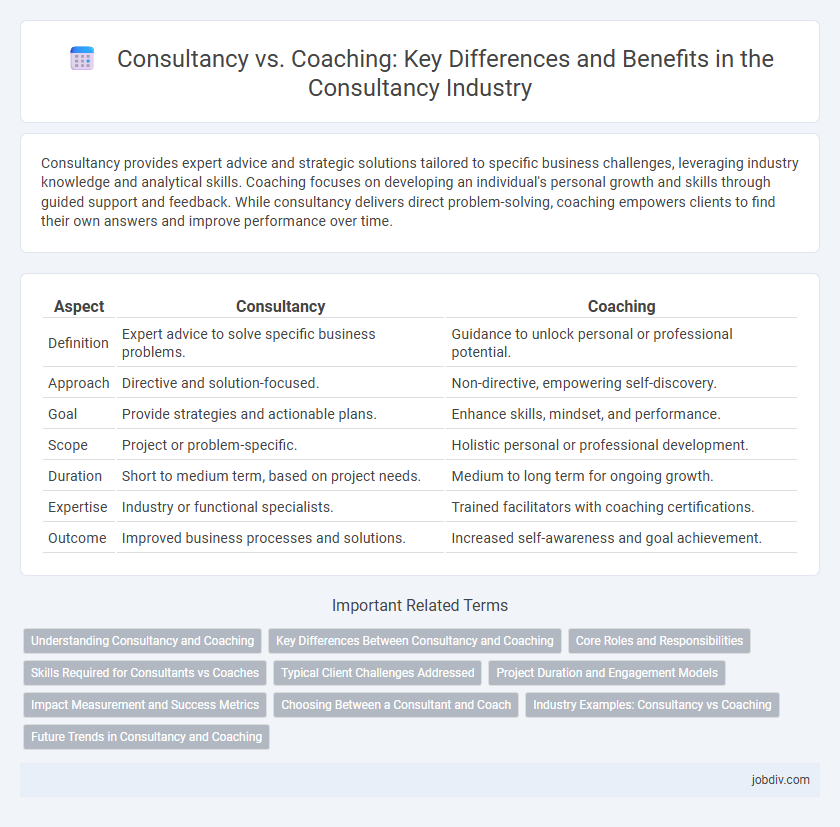Consultancy provides expert advice and strategic solutions tailored to specific business challenges, leveraging industry knowledge and analytical skills. Coaching focuses on developing an individual's personal growth and skills through guided support and feedback. While consultancy delivers direct problem-solving, coaching empowers clients to find their own answers and improve performance over time.
Table of Comparison
| Aspect | Consultancy | Coaching |
|---|---|---|
| Definition | Expert advice to solve specific business problems. | Guidance to unlock personal or professional potential. |
| Approach | Directive and solution-focused. | Non-directive, empowering self-discovery. |
| Goal | Provide strategies and actionable plans. | Enhance skills, mindset, and performance. |
| Scope | Project or problem-specific. | Holistic personal or professional development. |
| Duration | Short to medium term, based on project needs. | Medium to long term for ongoing growth. |
| Expertise | Industry or functional specialists. | Trained facilitators with coaching certifications. |
| Outcome | Improved business processes and solutions. | Increased self-awareness and goal achievement. |
Understanding Consultancy and Coaching
Consultancy involves providing expert advice and solutions to address specific business challenges, leveraging industry knowledge and analytical skills to improve organizational performance. Coaching focuses on personal or professional development by facilitating self-discovery, goal setting, and skill enhancement through guided conversations and feedback. Understanding the distinction enables organizations to choose consultancy for strategic problem-solving and coaching for empowering individual growth.
Key Differences Between Consultancy and Coaching
Consultancy involves providing expert advice and solutions based on specialized knowledge to improve business processes, whereas coaching focuses on empowering individuals or teams to develop skills and achieve personal or professional growth. Consultants typically diagnose problems and implement strategies, while coaches facilitate self-discovery and goal-setting through guided conversations. The key differences lie in the consultant's directive role versus the coach's supportive, client-centered approach.
Core Roles and Responsibilities
Consultancy primarily involves providing expert advice, strategic solutions, and specialized knowledge to solve specific business challenges, often focusing on analysis, planning, and implementation support. Coaching centers on personal and professional development through guidance, motivation, and skill enhancement, fostering long-term growth and self-improvement. Consultants deliver actionable recommendations based on industry expertise, while coaches facilitate client empowerment and goal achievement through continuous feedback and accountability.
Skills Required for Consultants vs Coaches
Consultants require strong analytical skills, industry expertise, and the ability to develop strategic solutions based on client data. Coaches focus on interpersonal communication, active listening, and motivational skills to facilitate client personal or professional growth. While consultants deliver expert recommendations, coaches guide clients to unlock their potential through targeted questioning and feedback.
Typical Client Challenges Addressed
Consultancy typically addresses challenges such as organizational restructuring, process optimization, and strategic planning, providing expert solutions tailored to specific business needs. Clients often seek guidance on compliance issues, technology implementation, and market expansion strategies. Coaching, in contrast, focuses on personal development obstacles like leadership skills, confidence building, and performance improvement.
Project Duration and Engagement Models
Consultancy projects typically have a fixed duration aligned with specific deliverables, emphasizing short to medium-term engagement models focused on problem-solving and implementation. Coaching engagements often extend over longer periods, fostering continuous development through iterative sessions and adaptive support frameworks. Both models prioritize client needs but differ in project scope, time commitment, and interaction frequency to optimize outcomes.
Impact Measurement and Success Metrics
Consultancy emphasizes comprehensive impact measurement through data-driven success metrics tailored to organizational goals, ensuring strategic improvements and measurable outcomes. Coaching prioritizes personal development metrics such as skill acquisition and behavioral change, focusing on individual performance enhancement. The distinction lies in consultancy's broader organizational impact assessment versus coaching's targeted personal success indicators.
Choosing Between a Consultant and Coach
Choosing between a consultant and a coach depends on your specific business needs; consultants provide expert advice and actionable strategies for solving problems or implementing change, while coaches focus on personal development and unlocking individual potential. Organizations aiming for targeted solutions often benefit from consultancy services that deliver industry expertise and structured project management. In contrast, coaching is ideal for fostering leadership skills, enhancing performance, and supporting ongoing professional growth.
Industry Examples: Consultancy vs Coaching
Consultancy and coaching serve distinct roles in industries; consultancy involves offering expert solutions and strategic advice, often seen in management consulting firms like McKinsey or Deloitte driving operational efficiency for clients. Coaching, prevalent in leadership development programs at companies such as IBM or Google, focuses on enhancing individual skills and performance through personalized guidance. Both approaches complement business growth but target different levels--consultancy addresses organizational challenges, while coaching develops personal capabilities.
Future Trends in Consultancy and Coaching
Consultancy increasingly integrates data analytics and AI to deliver predictive insights and tailored strategies, while coaching emphasizes personalized skill development and emotional intelligence for sustainable growth. Future trends highlight hybrid models combining consultancy's problem-solving frameworks with coaching's behavioral change techniques to enhance organizational agility. The convergence of digital tools and human-centric approaches is reshaping the consultancy and coaching landscape, driving innovation and more effective client outcomes.
Consultancy vs Coaching Infographic

 jobdiv.com
jobdiv.com